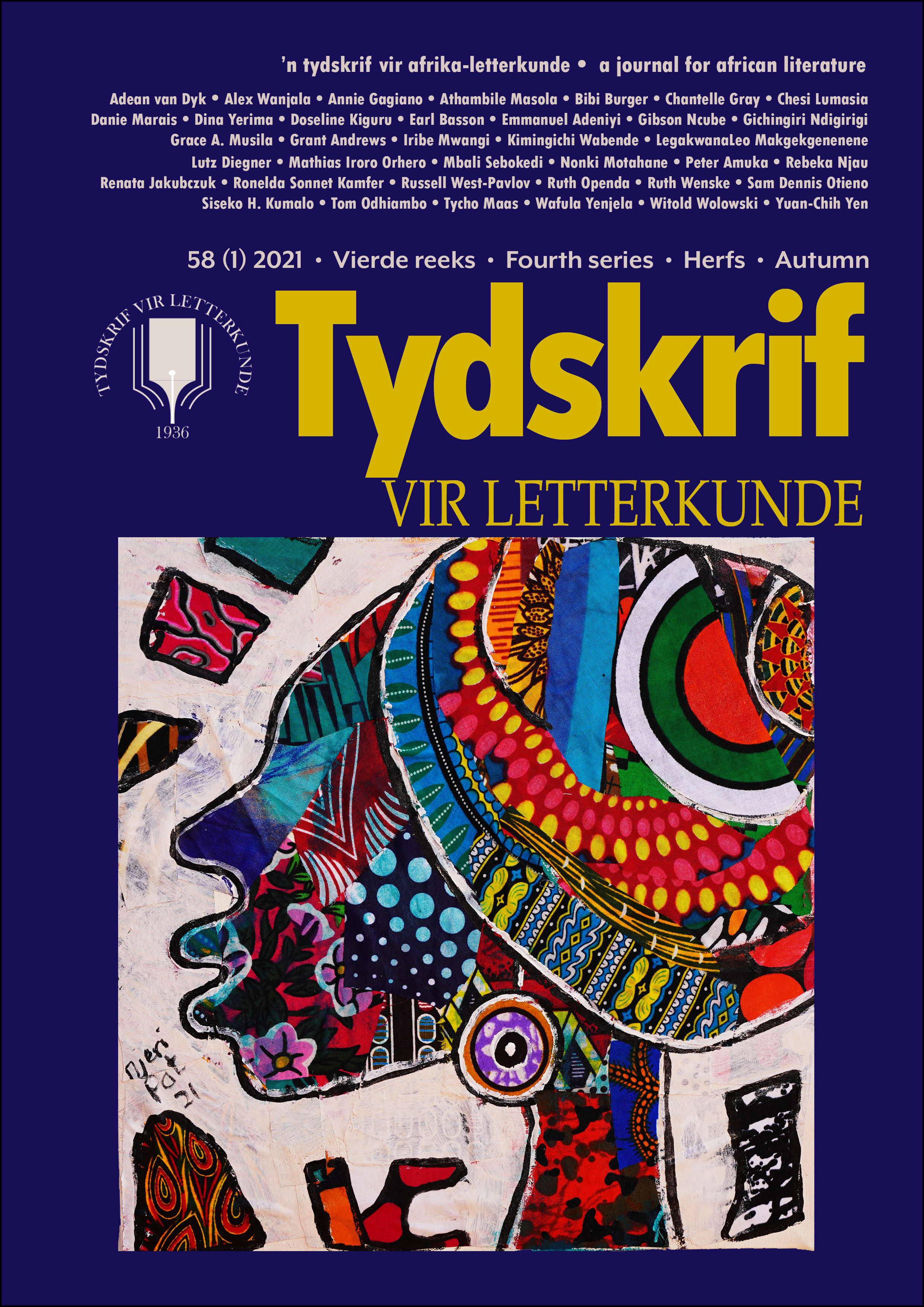Eastern African women writers’ ‘national epics’: A new force in creative fiction?
DOI:
https://doi.org/10.17159/tl.v58i1.8262Keywords:
‘national epics’, Eastern African women writers, localised histories, authorityAbstract
In this article, I bring five recent, substantial novels by Eastern African women writers together for the first time in a study regarding the texts as modern ‘national epics’, analysing some of their shared characteristics in foregrounding local participation in the making of East African ethno-national histories. I trace the novelists’ implicit, open-eyed moral evaluation of their leaders and peoples, neither sentimentalising nor deriding the often terrible struggles of their peoples against both inside and outside powers that seek to keep them in subjugation. The texts eschew traditional heroic portrayal of single, male leaders in national epics and allow us to grasp diverse, communal contributions to the growth of nationhood, while giving larger, often central roles to women. The texts earn the epithet ‘epic’ by authoritatively demonstrating that their embodied, localised histories matter, testifying to the wide human spectrum of the peoples they portray; as novelistic acts they are impressive and moving bids for recognition. As post-colonial endeavours, the texts effectively decentre colonial interventions. While the chosen novels are shown to be relatable, their individual power of portrayal and aesthetic achievements are scrupulously differentiated.
Downloads
References
Achebe, Chinua. Anthills of the Savannah. Heinemann, 1987.
Andrade, Susan Z. The Nation Writ Small: African Fictions and Feminisms, 1958–1988. Duke U P, 2011.
Africa Watch Committee. Somalia: A Government at War with its own People. Pitman, 1984.
Bakhtin, Mikhail M. “Discourse in the Novel.” The Dialogic Imagination: Four Essays, edited by Michael Holquist. Trans. Caryl Emerson & Michael Holquist. U of Texas P, 1981, pp. 259–422.
Boehmer, Elleke. Colonial and Postcolonial Literature: Migrant Metaphors (second edition). Oxford U P, 2005.
Fanon, Frantz. The Wretched of the Earth. Trans. R. Philcox. Grove, 2004.
Felski, Rita. The Uses of Literature. Blackwell, 2008.
Forna, Aminatta. “Daughters of Revolution.” New York Times Book Reviews, March 21, 2014.
Gagiano, Annie. “Postcolonial Illuminations of Past Betrayals in Tan’s The Gift of Rain and Owuor’s Dust.” The Wenshan Review of Literature and Culture vol. 12, no. 2, 2019, pp. 1–27. https://www.wreview.org/index.php/archive/55-vol-12-no-2/324-postcolonial-illuminations-of-past-betrayals-in-tan-s-the-gift-of-rain-and-owuor-s-dust-3.html.
Gagiano, Annie. “Women Writing Nationhood Differently: Affiliative Critique in Novels by Forna, Atta, and Farah.” Ariel: A Review of International English Literature vol. 44, no. 1, 2013, pp. 45–72. https://journalhosting.ucalgary.ca/index.php/ariel/article/view/35294.
Goebel, Walter & Saskia Schabio. “Introduction: Towards a Postcolonial Narrative Aesthetics.” Locating Postcolonial Narrative Genres, edited by Walter Goebel & Saskio Schabio. Routledge, 2013.
Griffiths, Frederick T. & Stanley J. Rabinowitz. Epic and the Russian Novel from Gogol to Pasternak. Academic Studies, 2011.
Head, Bessie. A Woman Alone: Autobiographical Writings, edited by Craig MacKenzie. Heinemann, 1990.
Knappert, Jan. “Swahili Oral traditions.” Journal of the Anthropological Society of Oxford vol. xiii, no. 1, 1982, pp. 22–30.
Lara, Maria Pia. Moral Textures: Feminist Narratives in the Public Sphere. U of California P, 1998.
Lihamba, Amandina et al. Women Writing Africa Vol. 3: The Eastern Region. The Feminist, 2007.
Lukàcs, Georg. The Theory of the Novel. Trans. Anna Bostock. The Merlin, 1971.
Makumbi, Jennifer N. Kintu. Oneworld, 2018.
Makumbi, Jennifer N. & Goretti Kyomuhendo. “Goretti Kyumuhendo in Conversation with Jennifer Nansubuga Makumbi.” Wasafiri vol. 33, no. 3, 2018, pp. 39–42. DOI: https://www.tandfonline.com/doi/full/10.1080/02690055.2018.1468403.
Mengiste, Maaza. Beneath the Lion’s Gaze. W.W. Norton, 2010.
Mengiste, Maaza. The Shadow King. W.W. Norton, 2019.
Mohamed, Nadifa. The Orchard of Lost Souls. Simon & Schuster, 2013.
Musila, Grace A. A Death Retold in Truth and Rumour: Kenya, Britain and the Julie Ward Mystery. James Currey, 2015.
Mwesigire, Bwesigye B. “Beyond the Afropolitan Postnation: The Contemporaneity of
Jennifer Makumbi’s Kintu.” Research in African Literatures vol. 49, no. 1, 2018, pp. 103–16. https://www.jstor.org/stable/10.2979/reseafrilite.49.1.07.
Nancy, Jean-Luc. “Finite History.” The States of “Theory”: History, Art, and Critical Discourse, edited by David Carroll. Columbia U P, 1990.
Okpewho, Isidore. The Epic in Africa: Towards a Poetics of the Oral Performance. Columbia U P, 1979.
Owuor, Yvonne Adhiambo. Dust. Granta, 2014.
Serpell, Namwali. The Old Drift. Penguin Random House, 2019.
Serpell, Namwali & Sana Goyal. “Playing with the Book: Namwali Serpell on ‘The Great Zambian Novel.’” Wasafiri vol. 35, no. 1, 2020, pp. 42–7. DOI: https://doi.org/10.1080/02690055.2020.1683293.
Shringarpure, Bhakti. “Maaza Mengiste and Nadifa Mohamed.” Warscapes. 29 Jan. 2012. http://www.warscapes.com/conversations/maaza-mengiste-nadifa-mohamed.
Tembo, Nick Mdika. “‘Made of Sterner Stuff’: Female Agency and Resilience in Nadifa Mohamed’s The Orchard of Lost Souls.” Journal of Literary Studies vol. 35, no. 3, 2019, pp. 1–18. DOI: https://doi.org/10.1080/02564718.2019.1657278.
United Nations Development Programme (UNDP). “Human Development Report—Somalia.” United Nations Development Programme, 2001. http://hdr.undp.org/en/content/human-rights-and-governance-somalia-2001.
Downloads
Published
Issue
Section
License
Copyright (c) 2021 Tydskrif vir Letterkunde

This work is licensed under a Creative Commons Attribution-ShareAlike 4.0 International License.


 https://orcid.org/0000-0001-6465-6584
https://orcid.org/0000-0001-6465-6584


.png)